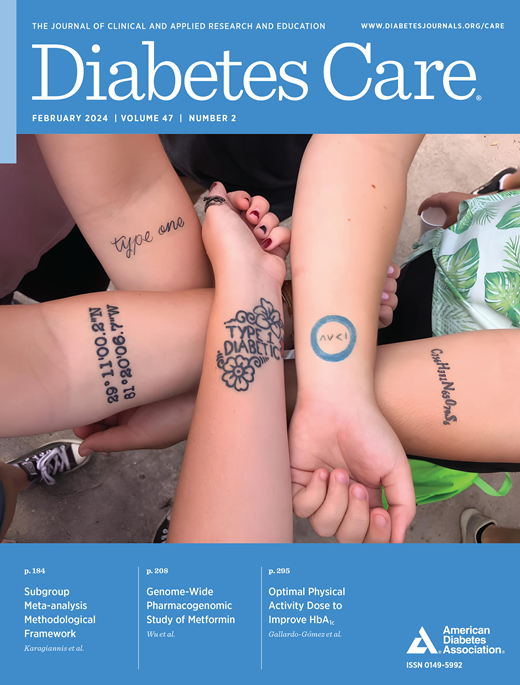Empagliflozin in Patients With Type 2 Diabetes Undergoing On-Pump CABG: The POST-CABGDM Randomized Clinical Trial
IF 16.6
1区 医学
Q1 ENDOCRINOLOGY & METABOLISM
引用次数: 0
Abstract
OBJECTIVE To evaluate the efficacy and safety of empagliflozin in patients with type 2 diabetes mellitus (T2DM) undergoing elective on-pump coronary artery bypass grafting (CABG). RESEARCH DESIGN AND METHODS Investigator-initiated, pragmatic, single-center, randomized, open-label trial with blinded outcome adjudication conducted in Brazil. A total of 145 patients with T2DM scheduled for elective on-pump CABG were randomized to receive empagliflozin 25 mg daily plus standard care (n = 71) for at least 3 months, which was discontinued 72 h before surgery, or to received standard care alone (n = 74). The primary outcome was postoperative acute kidney injury (AKI) within 7 days of surgery, defined by creatinine-based criteria (namely, Acute Kidney Injury Network; Risk, Injury, Failure, Loss of Kidney Function, and End-Stage Kidney Disease; or Kidney Disease: Improving Global Outcomes). Secondary outcomes included 30-day postoperative atrial fibrillation and type 5 myocardial infarction (MI). Safety outcomes were ketoacidosis, urinary tract infection, hospital-acquired pneumonia, and wound infection within 30 days after CABG. RESULTS AKI occurred in 22.5% of the empagliflozin group vs. 39.1% in the control group (relative risk [RR] 0.57 [95% CI 0.34–0.96]; P = 0.03). Rates of atrial fibrillation (15.4% vs. 13.5%; RR 1.15 [95% CI 0.52–2.53]; P = 0.73) and type 5 MI (1.4% vs. 4.1%; RR 0.35 [95% CI 0.04–3.26]; P = 0.62) were similar between groups. No statistically significant differences between groups were observed for safety events. Three deaths occurred, all in the control group. CONCLUSIONS Empagliflozin use before on-pump CABG in patients with T2DM was associated with a reduced incidence of postoperative AKI without an increase in safety events. These findings warrant confirmation in larger clinical trials.恩格列净在2型糖尿病患者接受无泵搭桥手术中的应用:搭桥后的随机临床试验
目的 评估empagliflozin对接受择期体外循环冠状动脉旁路移植术(CABG)的2型糖尿病(T2DM)患者的疗效和安全性。研究设计与方法 由研究者发起,在巴西进行了单中心、随机、开放标签、盲法结果判定的务实性试验。共有145名T2DM患者计划接受择期体外循环冠状动脉置换术(on-pump CABG),他们被随机分配接受empagliflozin 25 mg/天加标准治疗(n = 71)至少3个月,手术前72小时停药,或单独接受标准治疗(n = 74)。主要结果是术后7天内的急性肾损伤(AKI),根据肌酐标准(即急性肾损伤网络;风险、损伤、衰竭、肾功能丧失和终末期肾病;或肾病:改善总体结果)。次要结果包括术后30天心房颤动和5型心肌梗死(MI)。安全性结果包括 CABG 术后 30 天内的酮症酸中毒、尿路感染、医院获得性肺炎和伤口感染。结果 恩格列净组 22.5%的患者发生酮症酸中毒,对照组为 39.1%(相对风险 [RR] 0.57 [95% CI 0.34-0.96];P = 0.03)。各组心房颤动(15.4% vs. 13.5%;RR 1.15 [95% CI 0.52-2.53];P = 0.73)和 5 型心肌梗死(1.4% vs. 4.1%;RR 0.35 [95% CI 0.04-3.26];P = 0.62)发生率相似。在安全事件方面,未观察到组间有统计学意义的差异。三例死亡病例均发生在对照组。结论 T2DM 患者在接受胰岛素泵 CABG 手术前使用 Empagliflozin 可降低术后 AKI 的发生率,同时不会增加安全事件。这些发现值得在更大规模的临床试验中加以证实。
本文章由计算机程序翻译,如有差异,请以英文原文为准。
求助全文
约1分钟内获得全文
求助全文
来源期刊

Diabetes Care
医学-内分泌学与代谢
CiteScore
27.80
自引率
4.90%
发文量
449
审稿时长
1 months
期刊介绍:
The journal's overarching mission can be captured by the simple word "Care," reflecting its commitment to enhancing patient well-being. Diabetes Care aims to support better patient care by addressing the comprehensive needs of healthcare professionals dedicated to managing diabetes.
Diabetes Care serves as a valuable resource for healthcare practitioners, aiming to advance knowledge, foster research, and improve diabetes management. The journal publishes original research across various categories, including Clinical Care, Education, Nutrition, Psychosocial Research, Epidemiology, Health Services Research, Emerging Treatments and Technologies, Pathophysiology, Complications, and Cardiovascular and Metabolic Risk. Additionally, Diabetes Care features ADA statements, consensus reports, review articles, letters to the editor, and health/medical news, appealing to a diverse audience of physicians, researchers, psychologists, educators, and other healthcare professionals.
 求助内容:
求助内容: 应助结果提醒方式:
应助结果提醒方式:


